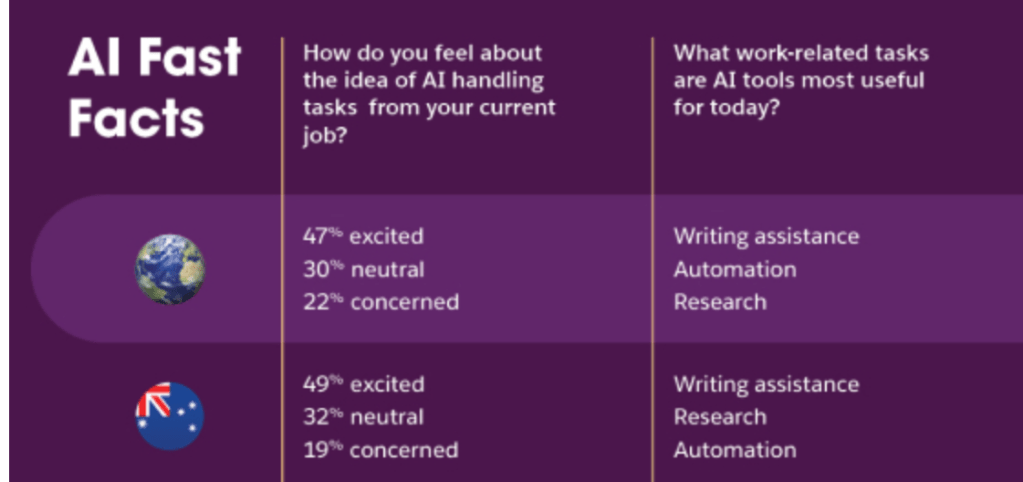Slack’s Workforce Lab surveyed 1,000 desk workers in Australia and found half are excited about using artificial intelligence, but the vast majority feel AI outputs are not completely trustworthy.

More than a third of desk workers use AI, according to new research from Slack. But there is deep distrust in Australia about using the technology for work-related tasks.
Just 13% of those surveyed strongly agree that they have received appropriate education to use AI efficiently. Those who have been trained to use the technology are three times as likely to say it has increased their productivity.
The Slack study comes at a time when a growing body of research suggests that the majority of Australians do not trust generative AI. A 2023 IPSOS survey found that 69% of Aussies say AI products and services make them nervous.
Research from the Australian federal government found that 78% of citizens distrust news written entirely by generative AI. 95% believe the use of generative AI should be disclosed by news sites.
Why the distrust?
Privacy and data security are the primary reasons given by Slack Workforce Lab. Other concerns include mistrust of data quality and accuracy. Globally 7% of people deem AI completely trustworthy for work-related tasks. That number reduces to 5% for Australian desk workers.
Denise Dresser is the CEO of Slack. She notes that while 95% of leaders globally want to use AI to make businesses more efficient, employees are feeling hesitant.

“Companies have urgent, ambitious goals for AI in the enterprise and our research shows there are huge productivity benefits to be gained—but many leaders are still figuring out how to kickstart adoption among employees,” says Dresser.
The research states that workers who are using AI have increased measures of employee engagement:
- +13% Level of access to relevant people, files and resources
- +18% Work-life balance
- +23% Ability to manage stress
- +24% Overall satisfaction with work
- +25% Flexibility
- +29% More likely to say they feel highly passionate about their work
Slack’s 3 takeaways for the AI future
The AI hype cycle is far from peaking—it’s just gearing up.
Gen Z and Gen Alpha show the most enthusiasm for AI, and as they enter the workforce the use of AI in the workforce is expected to grow, Slack’s research reveals.
“Globally 55% of workers ages 18 to 29 are saying they’re excited for AI and automation to handle parts of their work, compared with 33% of workers over age 60,” the report states.
AI could further marginalise women in the workforce—or give them a competitive edge.
Roughly 1 in 3 men have used the technology in the workplace. Slightly less women have tried AI at work (29%).
“Even though younger workers are most likely to have experimented with AI tools, the AI gender gap is largest among Gen Z. Men ages 18 – 29 are 25% more likely to have tried AI tools compared with women in the same age group,” according to the report.

AI is at risk of increasing busywork rather than reducing it.
The Slack data shows that globally, most workers experience burnout each month, and 30% are not passionate about their jobs. AI could be seen as a solution to take tedious tasks off worker’s shoulders – however, the research found that it could in fact increase busywork rather than reduce it.
“When asked how they would prioritise the time they get back from AI, ‘more admin’ topped the list, while innovating and creating, learning, skill-building, and networking with colleagues fell to the bottom,” the report reads.
The Slack Workforce Lab says the tendency for workers to feel frustrated by busywork is also evident locally.
“People in Australia spend over a third of their day on tasks that are ‘not meaningful to their job’ – such as unnecessary meetings, low-value emails, and excessive paperwork or data entry.”
Look back on the week that was with hand-picked articles from Australia and around the world. Sign up to the Forbes Australia newsletter here or become a member here.


